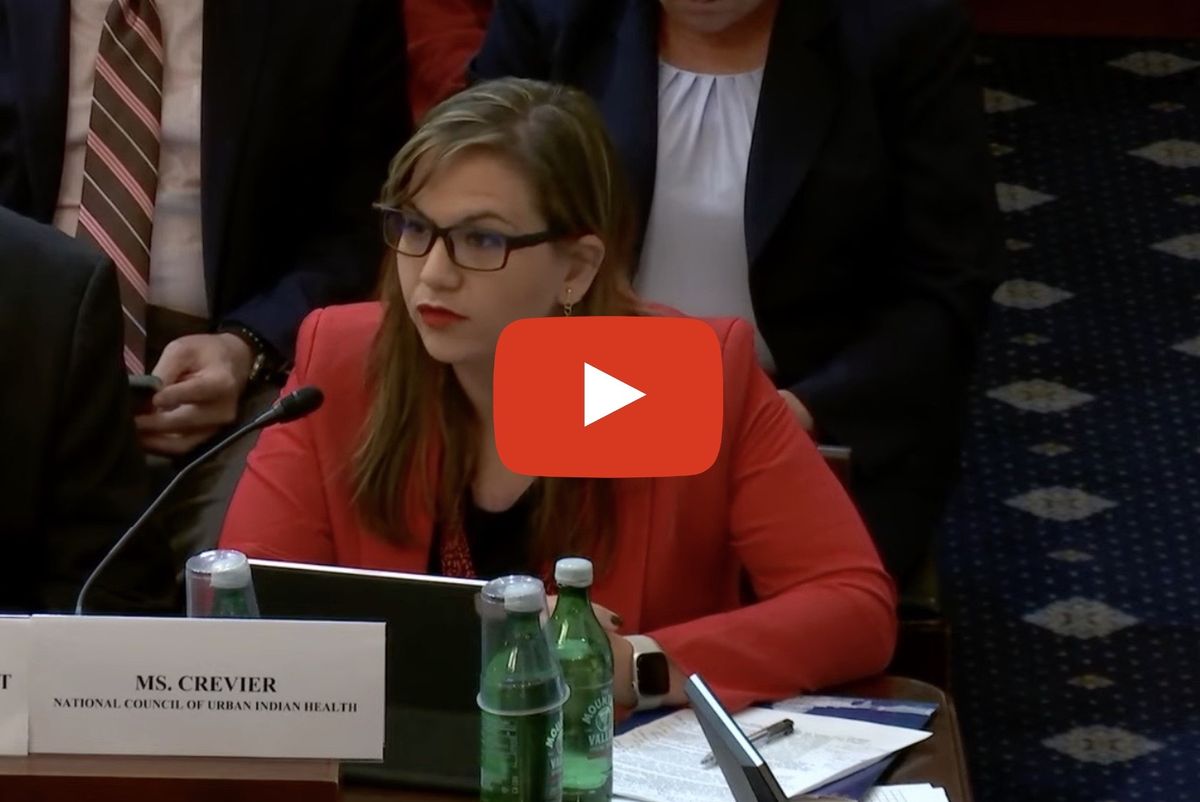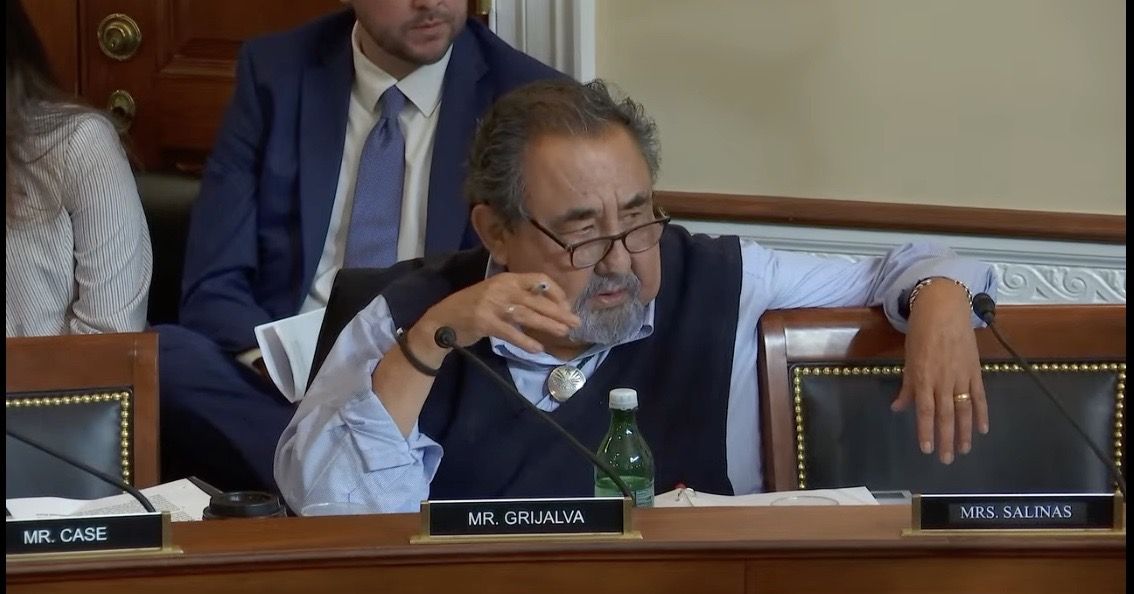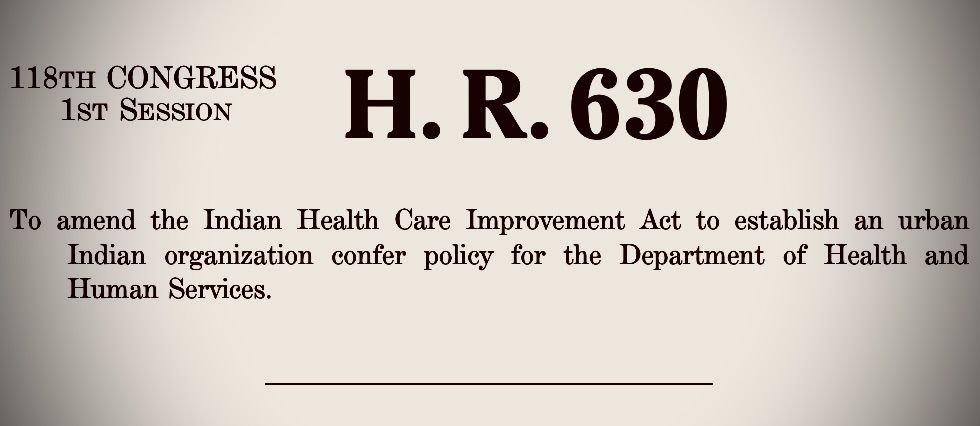Policy Update: Congressional Hearing Demonstrates Need for HHS Urban Confer Policy
The National Council of Urban Indian Health (NCUIH) CEO, Francys Crevier (Algonquin), testified before the House Natural Resources Subcommittee on Indian and Insular Affairs at a legislative hearing on the Urban Indian Health Confer Act (H.R. 630).
Congressional Hearing Reveals Critical Impact of Lack of Urban Confer Requirement on Urban Native Lives

NCUIH CEO Francys Crevier (Algonquin) testifies before the House Natural Resources Subcommittee on Indian and Insular Affairs.
WASHINGTON, D.C. (June 7, 2023) – On Wednesday, National Council of Urban Indian Health (NCUIH) CEO Francys Crevier (Algonquin) testified before the House Natural Resources Subcommittee on Indian and Insular Affairs in support of the Urban Indian Health Confer Act (H.R. 630), sponsored by Ranking Member Raúl Grijalva (D-AZ-7). This legislation passed by 406 votes in the last session of the House of Representatives and is up for consideration again this Congress. On March 29, 2023, the Senate Committee on Indian Affairs passed out of committee the Senate bipartisan companion bill (S.460) introduced by Senator Smith (D-MN) and Senator Mullin (R-OK). NCUIH will request a full House Committee markup and expeditious floor consideration.
Go deeper: The legislation, H.R. 630, would establish an urban confer requirement between Department of Health and Human Services (HHS) agencies and offices and urban Indian organizations (UIOs).
Crevier spoke on the critical importance of establishing a confer process within HHS in matters relating to the provision of healthcare to urban American Indians and Alaska Natives.
In her opening statement, Crevier called attention to the government’s violation of the trust obligation to Native people by not considering the health of those who reside in urban areas, “when we submit letters to HHS regarding our issues, they are not required to respond due to the lack of a confer policy, meaning 70% of our population often is not considered when it comes to HHS initiatives.”
Underscoring challenges faced during the COVID-19 pandemic that were exacerbated by a lack of confer, Crevier further highlighted the need for a clear communication pathway between federal health agencies and UIOs.
In particular, Crevier highlighted that key information regarding vaccine distribution for the initial COVID-19 vaccine rollout was miscommunicated which resulted in delayed distribution to many UIOs putting UIO patients at risk.
“The lack of an urban confer requirement between HHS and UIOs has resulted in missed opportunities for information and resources, endangering the lives of Native people.“
-NCUIH CEO, Francys Crevier (Algonquin)
What they’re saying:
In her opening remarks, Ranking Member Teresa Leger Fernández (D-NM-3) emphasized the barrier to UIOs in receiving life-saving vaccines for Native patients, noting that “the lack of communication between HHS and UIOs with the vaccine rollout illuminated the real problem when you don’t have a confer policy.”
Bipartisan Members of Congress Emphasized the Need for Urban Confer Legislation

Representative Grijalva, Sponsor of H.R. 630
Rep. Raúl M. Grijalva (D-AZ-7), who introduced this legislation, stressed its importance to urban Native communities, “[H.R. 630] is about correcting history and avoiding future problems.” –
What they’re saying:
In response to Crevier’s testimony, Chair Harriet Hageman (R-WY-AL) mentioned her conversations with HHS and the need for an urban confer policy, emphasizing that “we must do a better job at providing healthcare to our tribal members, we have got to do better…it is extremely important that we start fixing situations and that it is absolutely unacceptable in terms of the quality of health care to our tribal members.”
Remarks from HHS
In her opening statement, Melanie Egorin, HHS Assistant Secretary for Legislation, stated that “HHS is dedicated to enhancing the health and well-being for all Americans and affirming our relationship with AI/AN communities to improve the health and safety of tribal communities.”
Egorin further stated that “The Indian Health Service is the only agency within the federal government to implement this formal process, as a best practice, and is a critical partnership opportunity.”
Rep. Teresa Leger Fernández reaffirmed her support for this legislation, responding to Egorin’s remarks that “There may be good best practices, but we want to make sure that best practices become statutory to ensure a good anchor for these conversations to continue.”
Urban Confer in Practice

Why it matters: This commonsense solution has garnered bipartisan support from Congress, as demonstrated by its passage in the House last Congress by 406 votes.
- Currently, IHS is the only agency required to confer with UIOs on matters affecting Native people.
- Inclusivity and Representation: UIOs represent the interests and needs of American Indians and Alaska Natives living in urban areas, who make up over 70% of the Native population. By establishing an urban confer requirement, Congress would ensure that the voices of urban Native communities are heard and included in decision-making processes that impact their healthcare services.
- Responsive Policy-Making: Requiring urban confer would provide HHS with the opportunity to gather firsthand information and insights from UIOs regarding the challenges, priorities, and solutions necessary for improving the health and well-being of urban Native populations. This direct engagement facilitates more informed and responsive policy-making, leading to the development of effective legislation that addresses the unique needs of urban Native communities.
- Strengthening the Indian Healthcare System: UIOs play a crucial role in the Indian healthcare system by providing essential healthcare services to urban Native populations. By establishing an urban confer requirement, Congress would ensure that UIOs have direct communication channels with relevant federal health agencies, leading to improved coordination, collaboration, and resource allocation. This strengthens the overall Indian healthcare system, benefiting both UIOs and Tribal healthcare facilities.
- Access to Resources and Information: Urban confer sessions enable UIOs to access critical information, resources, and opportunities from federal health agencies. It helps prevent missed opportunities, miscommunication, and delays in the delivery of healthcare services to urban Native communities. By fostering open and free exchanges of information, urban confer sessions ensure that UIOs receive timely and accurate information, enhancing their ability to serve their patients effectively.
- Upholding Federal Trust Responsibility: The federal government has a trust responsibility to provide healthcare services to Native people, regardless of their geographic location. An urban confer requirement recognizes the federal government’s obligation to fulfill this responsibility and ensures that all agencies within HHS engage with UIOs. It establishes a formal process for meaningful consultation and collaboration, reinforcing the government’s commitment to improving healthcare for Native populations.
Go deeper:
Next Steps:
NCUIH will continue to advocate for passage of H.R. 630 and S. 460.






Leave a Reply
Want to join the discussion?Feel free to contribute!